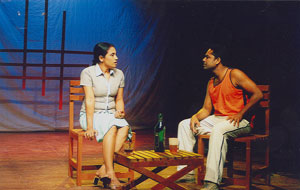As twilight took possession of the Tower Hall on January 26, I took a seat with much anticipation to watch another production by my favourite stage director, Rajitha Dissanayake. Having seen his Veeraya Merila (The Hero is Dead) back in 2002, and been amazed by his rare creativity I was expecting a lot.
I recalled why I was taken by surprise when I saw that drama nearly a decade ago.
There was no Veeraya (hero) in the first place through the development of the drama; the Hero suddenly emerges with his death. And thereafter the audience is never to see him again! The void created by his death makes us crave to see him again, not as just another character -that he had been throughout up till that moment- but as the hero. Yet, we never get that chance. I anticipated something similar from Sihina Horu Arang but it was quite different.
 |
First staged in 2004, Sihina Horu Arang won the best drama award in the State Drama Festival in 2005. I regret that I was unable to see it then, when the crux of the matter - the war, dirty politics and their effects on both private and public lives was much felt. The difference between now (2011) and then (2004/5) is that society is not plagued by an overt war now as in 2004/5. (I say overt war for two reasons; one, the covert war is still going on, in relation to the overall corruption in society and the cost of living and two, there are international forces working against the stance the Sri Lankan government took in defeating terrorism, but the dirty politics in society is the same.) Thus, I found myself questioning the contextual relevance of the drama while trying to locate it in contemporary society.
Any artistic work could be discussed locating it in the context where it is centralized or it could be looked at locating it in society. In doing the latter, I realized how far we have moved away from the war mentality and the uncertainty of our lives. Suddenly, the soldier, his pension and the would-be compensation (with his death), sudden arrests under the Law of Emergency have became alien concepts or forgotten memories. The silent agony of the soldier created by the uncertainty of life has been transformed in less than two years. Now the uncertainty is that the same soldier who was trained to hold the gun is being trained to do gardening and sell goods and vegetables!
Not long ago our ears were tuned to the announcement “… under the Emergency law of the country.” Our society seems to be relieved from all those agonizing episodes. Yet, the truth is far from that. Now we have new agonies manifested through phrases such as “a coconut is 60 rupees”, “no salary increase”, “can’t make ends meet”, etc in our daily conversations. Thus, both the availability and the unavailability of certain utterances make the drama “outdated”. The effects of contextual relevance in 2004 have been turned into effects of contextual irrelevance in 2011, making the audience reflect upon the past and the present. Therefore, in my opinion, more than finding new readings in the drama, we find new readings in the society we live in through the drama.
Rajitha has always been excellent in the use of human emotions. The craving for lust, love and caring are seen here - achingly true is the painful quest for love and the shattered dreams of the woman. It is true at all times that there is the women’s helplessness before the ruthlessness of the man. Rajitha makes his two female characters vulnerable in the face of male dominance. The harshness of the words uttered by a man after sharing pleasure with the woman is perhaps universal, yet the reaction or the helpless response of the female is more Asian.
In the pursuit of one’s dream, abandoning one’s humdrum life is universal. The young singer is chasing a star but society does not allow him to reach it. The generation gap and the gap between the haves and have-nots are also portrayed clearly.
The corrupt politicians may not be universal, but perhaps region-specific or developing country-specific. The exploitation and the misuse of power and abandonment of listening to one’s conscience could be considered as general characteristics of politicians in the third world. These features are well brought out in the drama.
The music and the songs intensify the artistic quality of the drama. Taken separately, the songs would be hits and blended in the play, they add passion and emotion.
“Sihina Horu Arang’ has a definite impact on the audience in relation to the comparison between present and past vis-à-vis society and makes the audience reflect continuously upon the past we have just experienced.
The play would have been most relevant when the drama’s main theme directly addressed the most poignant social problem in recent Sri Lankan history. Now one needs to find new readings in it at different points of time. |


